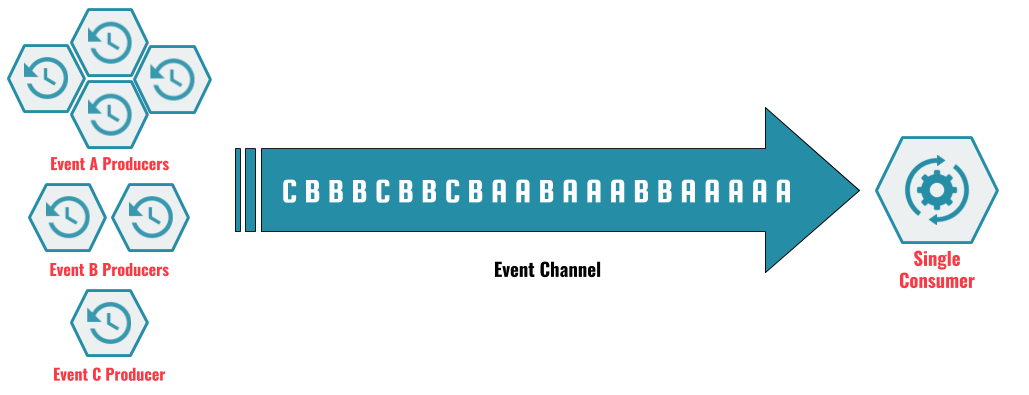Here’s the scenario: we have a buffered channel that’s being read by a single Go routine and is written to by multiple go routines. For simplicity, we’ll say that the channel accepts events and that the other routines generate events of specific types, A, B, and C. If there are more of one type of event generator (or some producers are faster than others) we may end up in the situation where there are a series of the same events on the buffered channel. What we would like to do is read all of the same type of event that is on the buffered channel at once, handling them all simultaneously; e.g. aggregating the read of our events.

An initial solution is composed of two loops; the first loop has a select that performs a blocking read of either the msgs or a done channel to determine when to exit the go routine. If a msg is received a second loop labeled grouper is initiated with a non blocking read of the msgs channel. The loop keeps track of a current and next value. If next and current are the same, it continues reading off the channel, until they are different or there is nothing to read at which point it handles both next and current.
func consumeAggregate(msgs <-chan string, done <-chan bool) {
var current, next string
var count int
for {
// Outer select does a blocking read on both channels
select {
case current = <-msgs:
// count our current event
ecount = 1
grouper:
// continue reading events off the msgs channel
for {
select {
case next = <-msgs:
if next != current {
// exit grouper loop and handle next and current
break grouper
} else {
// keep track of the number of similar events
count++
}
default:
// nothing is on the channel, break grouper and
// only handle current by setting next to empty
next = ""
break grouper
}
}
case <-done:
// done consuming exit go routine
return
}
// This section happens after select is complete
// handle the current messages with the aggregate count
handle(current, count)
// handle next if one exists
if next != "" {
handle(next, 1)
}
}
}
This solution does have one obvious problem; the next value is not aggregated with similar values that happen after. E.g. in the event stream aaaabbb, the calls to handle will be (a, 4), (b, 1), (b, 2). The good news though is that testing with the race and deadlock detector show that this method is correct. Possible improvements for a future post include:
- Aggregate the next value
- Read
val, okfrom the channel to detect if it’s closed to exit - convert the outer loop to a
rangeto complete when the channel is closed
Here is the Aggregating Channel Gist that contains the complete code and tests.